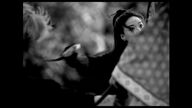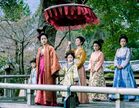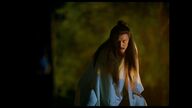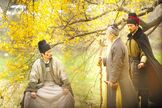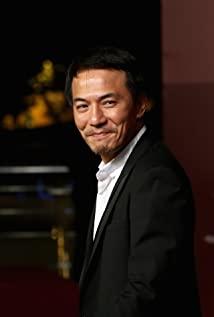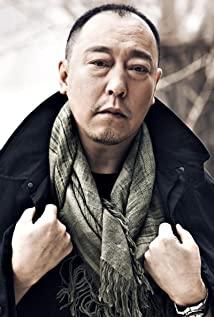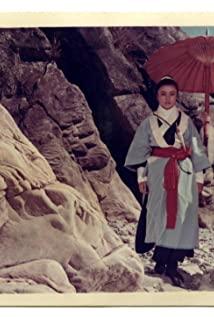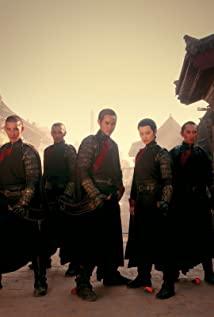Hou Xiaoxian's "Nie Yinniang" is full of secret but also fanfare clues. He holds it tightly and spreads it to people at any time.
This movie has swords and swords, but it is not martial arts; it has concubine jealous, but it is not palace fighting; it is powerful, but it is not history. Judging from its name, it can be regarded as a biography of a person, but it has always been shadowed, and Nie Yinniang floats around like a shadow. Wandering is the posture of the protagonist in this movie. She was taken away by the Taoist aunt when she was a child, but she never disappeared. She has been floating around in people's hearts. Later, when she returned home from school, she began to float above people's heads again. And the saddest thing is that she herself knows that she is a shadow, where it is projected, it will be dark, and between light and light, it will take human life. But why is it necessary to take human lives? Someone told her that it seemed unnecessary to listen or understand, and there was no reason to understand. In this way, she became a machine. It was like the weapon she was holding in her hand.
She is passive and passive all her life.
Being taken away from a young age, there is no way to resist, and when he is sent down the mountain in the future, he has no choice. She kills, returns to life, and is not allowed to be emotional. But the bad is bad, she still has feelings. Seeing that the child is cute, the knife is soft; seeing the childhood sweetheart, the killing intent is dull... This is loneliness.
Lonely is the most terrible. This is the secret root of Hou Xiaoxian's filming of "Nie Yinniang".
Some people say that it is freehand, but in fact it is extremely realistic. The silence and coldness between the characters is the reality, and the past movies with such a flowing dialogue are just dramas, right? Some people say that it is just a Tang legend, but it may be contemporary history. Isn’t the female assassin played by Hsu Qi resembling you and me? We were inexplicably placed into the mortal dust, added inexplicably identities, inexplicably promised a mission, but failed to cut off the six roots. We ourselves were trapped there, no one in the wilderness, and we were unwilling to walk in solitude; stay in the dust, Where can it be safe?
Nie Yinniang returned home and listened to her family talking about what happened after she left, as if she had become a soul, pulling away from the mortal world, looking down at everything, and being helpless, how to resist the grief? Shu Qi put her palm tightly on her face, her grief was silent but deafened. Is this just legend and antiquity? When she cried, wasn't it her own reality, wasn't it the incomprehension of all our mortals? Who of us has never cried like this? We cry all mundane things, but aren’t mundane things also the black hole of predicament?
Since going down the mountain, the assassin has become more and more frustrated. People fall into the mortal world, that's probably the case.
She turned the assassination visits into reluctant visits. With the sword in her hand, she always hurts the most every time. It's just that the blood is not stained, and who can see the scars in her heart? Others have the world in their hands, and the beauty is in the arms, but what about her? A piece of jade, a knife, half-life, fighting back and forth, what do you get? Still lonely.
Going up the mountain, pushing her heart to the master, but they are standing in the clouds and mist, and they also say something in the clouds and mist, seemingly detached, but the words are still full of earthly hatred, she knows that this is no longer home; down the mountain, To her family, she can only be silent. Have you seen what she said to anyone? The family told her about the helplessness and struggle surrounding her life experience, and all they heard were boredom and calculations, but it seemed to be a big deal after thinking about it. What can be done now? The girl who became an assassin, holding a knife, wearing black, standing on the beams and corners of people's houses, where is the cold blood of an assassin? In some cases, she could only ask for it when she saw the fireworks in the world.
There is hardly a movie that exaggerates the loneliness in the ancient sense to such a level of compassion that it describes the robe and the sword, but allows the cold to penetrate the blood vessels of the people in the contemporary city.
It is true that few people shoot movies like this anymore. The film shows the roughness that could not be seen in the digital age. The large tracts of thatch shakes with the wind, the clouds come and go, the birds call and the insects linger... Hou Xiaoxian did not create an ancient meaning. He seems to be only adhering to contemporary thoughts and returning to that era, so there are very few dramatic fly-overs and dance-like rehearsals of swords, lights, swords and shadows. All entanglements and fights can’t stop there. There is a sense of beauty, but it is not distorted, because What he cares to express is not those kind of gratitude and sect moves. What he wants to say is loneliness, eternal loneliness, and universal loneliness of mankind. No matter how time passes, no matter how time passes, loneliness has never changed. Never dissipated. This is pain first, then predicament, and then there is a vague sense of Zen.
Some people are afraid of the half-text of "Nie Yinniang", and some people are indifferent to the story of the legend of the Tang Dynasty. You can imagine what kind of market feedback "Nie Yinniang" will have in this one-dimensional crude film market. It's not so easy to understand, but more importantly, some movies are not meant to let people see the succession, and finally "understand". They exist to tell you that there are some things you can't tell, but you can feel it. Until, it is jammed in the part between your heart and your lips and teeth. You want to absorb it but you can’t do anything. You want to confide but you can’t do anything. Those things are the real taste of this kind of movie. It’s like the mountains in this movie. Among these things, loneliness is included.
(Text/Yang Shiyang)
View more about The Assassin reviews



